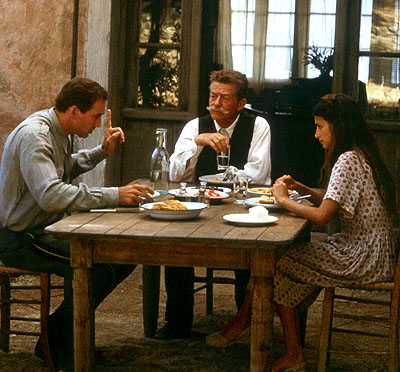While researching for a recent article about the relationship between Germany and Greece in the Euro-zone mess, I came across a reference in Wikipedia to the book “Corelli's Mandolin”, and remembered having seen the movie based on it with Nicholas Cage and Penelope Cruz a number of years back, and having enjoyed it. On impulse I ordered the book from Amazon. Why not – despite having being written by a Brit with a French name I'd never heard of.
It turns out that “Corelli's Mandolin” overflows with love, life, death, humor, pathos, war, romance and history. It will have you crying on one page and laughing on the next, and occasionally both on the same page – at least it did me.
Cephallonia is a Greek island where the old gods, until recently, still had a role and where the local saint's bones were dragged out every year on his name-day in order to let him cure at least one mad person from the insane asylum – and he never failed. So, you see, we're dealing with a paradise of sorts except for the ignorance and prejudices of its inhabitants. Among them are our heroin, Pelagia, a beautiful, strong-willed young woman, and her father, a pseudo-scientifically oriented, but basically wise doctor.
Then the war comes to interrupt the idyll. Mussolini's invading Italians had proven no match for the Greek army. While they were being beaten back in the east, though, the Germans invaded from the north-west and soon conquered the whole country. They then gave the Italians most of the occupation duties in a few places as a reward for at least being allies, albeit incompetent ones.
The Captain in charge of the Italian occupation is none other that Antonio Corelli, a musician – mandolin of course – who joined the army because it was a place where a musician could practice to his heart's content without have to worry about where the next meal was coming from. He hadn't counted on the war though.
The Italians are quite content to be on what turns out to be an extended vacation, despite the native population's contempt. “It is our duty to hate them,” the doctor tells his daughter Pelagia, who, despite trying her best to hate him, falls in love with Corelli, who is billeted in their home. And he with her, naturally. The ancient by-the-fates-condemned tragic love formula.
A minor but entertaining character is the English spy who parachutes onto the island. He lands on a hilltop where the old Greek shepherd who tends to him thinks at first he must be an angel, the only beings he can conceive of who drop in from heaven. But he understands not a word of angel-speak, so he brings him to the doctor, who might understand him. Actually, the spy is an Eton-Oxford educated scholar who speaks a Greek of sorts: ancient Greek, transliterated as “Sire, of your gentilese, by the leve of yow wol I speke in pryvetee of certeyn thyng.” The doctor introduces him to Pelagia, with the comment: He speaks Greek like a Spanish cow. To Pelagia: “I preise wel the fresshe beautee and age tendre, I trow.” Finally the doctor insists on speaking English, to the spy's immense relief. Later when he infiltrates the Italian forces disguised as a priest he speaks to them in Latin. They decide he is a holy but harmless madman – the perfect cover for his inept covert work.
But when the war is nearing its end he cannot convince the British to liberate Greece, for they and the Americans are intent on finishing off Italy first. When that happens and Mussolini is hung by his feet to rot, the Führer gives the order to the German army to obliterate the Italian troops still in Greece. It is accomplished. The German general, by falsely offering safe conduct to nearby Sicily, tricks the Italians and his men murder more that 5,000 Italian soldiers. (This is true, I checked it out.)
Unsurprisingly, Corelli escapes by the skin of his teeth and is spirited away with the help of the mad English spy. Also unsurprisingly, the Germans prove to be the same brutal occupiers in Cephallonia that they were elsewhere. But Pelagia survives.
Shakespearean misunderstandings ensue and our lovers are apparently separated for good. A Greek saying indicates that eternal love lasts for two years in Italy, whereas a Greek loves himself and his mother eternally, his wife for six months. Antonio Corelli, despite becoming more Greek than Italian, does not fit either stereotype. And Pelagia remains faithful and chaste for far longer than even the gods could require.

If you read this book because of this fervent recommendation, you will thank me eternally.
Frank Thomas Smith
